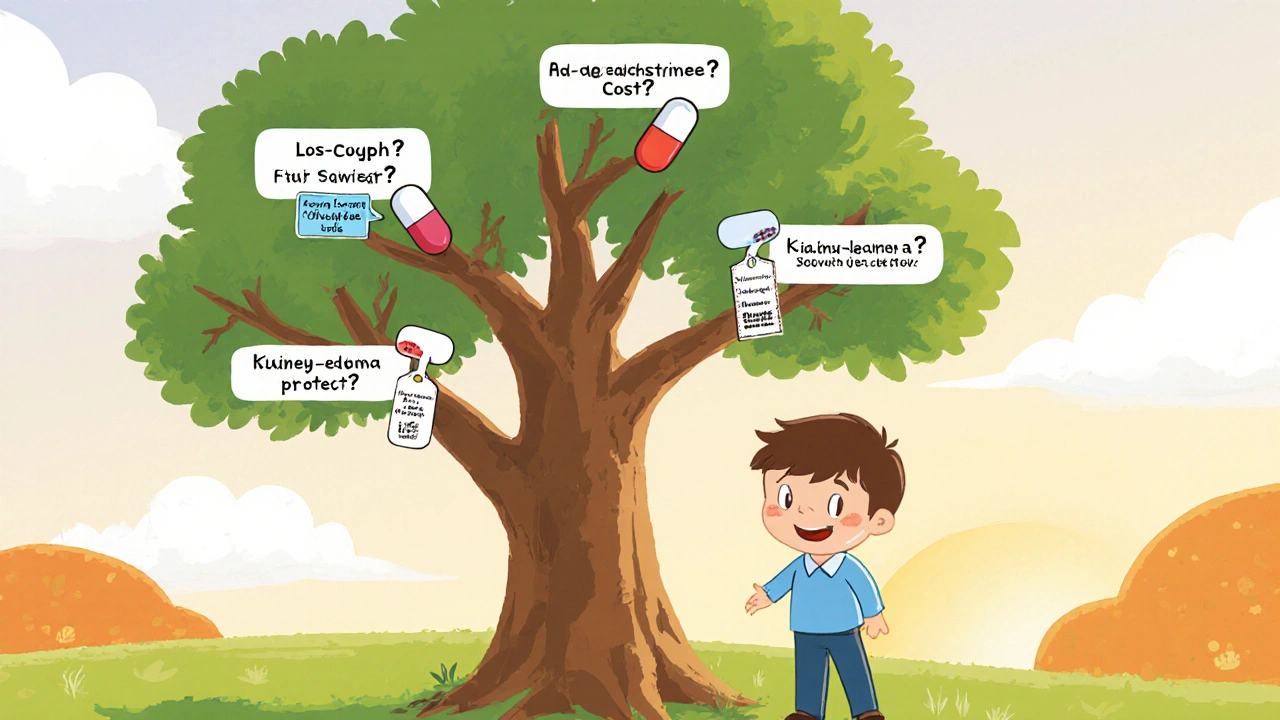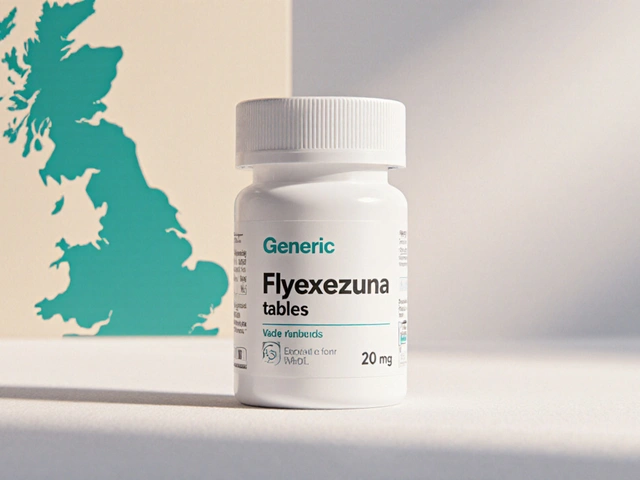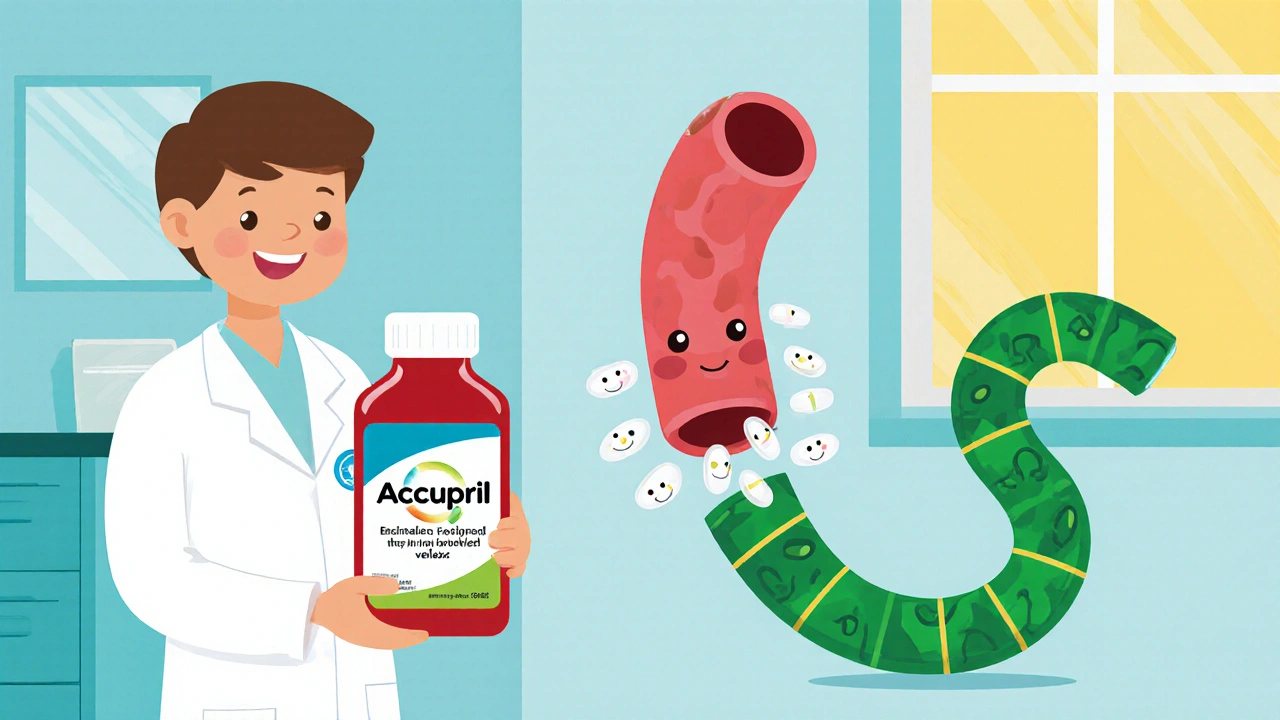Hypertension Drug Selector
Personalized Hypertension Medication Guide
Select your medical profile to see which hypertension medication might be most suitable for you. Based on your choices, we'll provide recommendations aligned with the latest clinical guidelines.
When your doctor says you need a pill to tame high blood pressure, the first name that often pops up is Accupril. But you’re not the only one asking: Is there a better option for me? Below we break down what Accupril actually does, compare it head‑to‑head with the most common alternatives, and give you a clear picture of who should reach for which drug.
What is Accupril?
Accupril is the brand name for quinapril hydrochloride, an ACE (angiotensin‑converting enzyme) inhibitor used to lower blood pressure. It works by blocking the enzyme that tightens blood vessels, allowing them to relax and let blood flow more freely. The typical starting dose is 10-20 mg once daily, and most guidelines recommend adjusting the dose based on how your systolic/diastolic numbers respond.
Key attributes of Accupril:
- Active ingredient: quinapril
- Class: ACE inhibitor
- Half‑life: ~2 hours (active metabolite lasts ~12 hours)
- Common side effects: dry cough, dizziness, elevated potassium
- Average UK price (2025): £12‑£18 for a 30‑day supply
Why look at alternatives?
Not everyone tolerates the classic ACE‑inhibitor cough, and some people have medical conditions-like kidney disease or a history of angio‑edema-that make other classes a safer choice. Insurance formularies also vary, meaning a different drug might be cheaper for you. Below we cover the three biggest families that often replace Accupril:
- Other ACE inhibitors (e.g., lisinopril, enalapril)
- Angiotensin II receptor blockers, or ARBs (e.g., losartan, valsartan)
- Calcium‑channel blockers (e.g., amlodipine)
Side‑by‑side comparison
| Drug | Class | Typical dose | Key benefit | Common drawback | 2025 UK price (30 days) |
|---|---|---|---|---|---|
| Accupril (quinapril) | ACE inhibitor | 10‑40 mg daily | Proven mortality benefit in heart failure | Cough in ~10 % of patients | £12‑£18 |
| Lisinopril | ACE inhibitor | 10‑40 mg daily | Long‑acting, once‑daily for most people | Same cough risk as Accupril | £9‑£14 |
| Enalapril | ACE inhibitor | 5‑20 mg daily | Well‑studied in diabetic kidney disease | Higher chance of hypotension on start | £11‑£16 |
| Losartan | ARB | 25‑100 mg daily | No cough, good for patients with angio‑edema history | May raise potassium more than ACE inhibitors | £13‑£19 |
| Valsartan | ARB | 80‑320 mg daily | Effective in heart‑failure with reduced ejection fraction | Potential drug‑drug interactions with NSAIDs | £14‑£21 |
| Amlodipine | Calcium‑channel blocker | 5‑10 mg daily | Very low chance of cough or angio‑edema | Puffiness in ankles for some patients | £8‑£12 |
How to pick the right drug for you
Choosing a blood‑pressure pill isn’t a one‑size‑fits‑all decision. Below is a quick decision‑tree you can run through with your clinician:
- If you have a dry cough after starting an ACE inhibitor, ask about switching to an ARB (e.g., losartan).
- If you’ve experienced angio‑edema previously, stay away from all ACE inhibitors and ARBs-consider a calcium‑channel blocker like amlodipine.
- For people with diabetes‑related kidney disease, ACE inhibitors or ARBs are preferred because they protect the kidneys.
- When you need a once‑daily, low‑maintenance regimen, long‑acting ACE inhibitors (lisinopril) or ARBs (valsartan) are good picks.
- If you’re on multiple medications that raise potassium, avoid drugs that further increase it (some ARBs).
Always factor in cost, insurance coverage, and any co‑existing conditions. Your GP will usually start low, monitor your BP for two weeks, then adjust.
Potential pitfalls and how to avoid them
- Skipping doses: Missing a day can cause a rebound rise in pressure. Set a daily alarm.
- Combining with NSAIDs: Over‑the‑counter painkillers can blunt the blood‑pressure‑lowering effect. Use acetaminophen when possible.
- Pregnancy: ACE inhibitors and ARBs are unsafe in the second and third trimesters. Switch to methyldopa if you become pregnant.
- Kidney labs: ACE inhibitors can raise creatinine slightly. Your doctor will check kidney function after the first month.
- Electrolyte balance: Potassium‑rich foods (bananas, avocados) may need moderation if you’re on an ARB.

Real‑world stories
Sarah, a 58‑year‑old from Manchester, started Accupril in 2023. After three months she complained of a persistent dry cough that kept her up at night. Her GP switched her to losartan, and the cough vanished while her blood pressure stayed stable at 124/78 mmHg. She saved about £4 a month because her insurance preferred the ARB.
Mike, a 62‑year‑old with chronic kidney disease, stayed on Accupril because his nephrologist valued its proven kidney protection. Over the past two years his eGFR dropped only 2 mL/min, far slower than the average for his age group.
Quick reference cheat sheet
- Best for cough‑free patients: Losartan or Valsartan (ARBs).
- Best for kidney protection: Any ACE inhibitor (Accupril, Lisinopril, Enalapril) or ARB.
- Cheapest option in 2025: Amlodipine or generic Lisinopril.
- Most common side effect overall: Dry cough (ACE inhibitors).
- Contraindicated in pregnancy: All ACE inhibitors and ARBs.
Frequently Asked Questions
Can I take Accupril and a calcium‑channel blocker together?
Yes, doctors often combine an ACE inhibitor with a calcium‑channel blocker to achieve better control, especially in resistant hypertension. Watch for low blood pressure and monitor kidney function.
How long does the cough from Accupril last?
If you’re sensitive, the cough can start within days and persist as long as you stay on the drug. Switching to an ARB usually stops it within a week.
Is Accupril safe for people over 80?
Older adults can use it, but doctors start at the lowest dose (5 mg) and watch for dizziness or kidney changes.
What should I do if I miss a dose?
Take it as soon as you remember unless it’s almost time for the next dose-then just skip the missed one. Never double up.
Are there any food restrictions with Accupril?
Avoid large amounts of potassium‑rich foods if you’re also on an ARB. Otherwise, a normal balanced diet is fine.
Bottom line: Accupril remains a solid first‑line choice, but the landscape of hypertension pills is wide enough that a personalized match can improve comfort, cost, and outcomes. Talk to your clinician, run the quick decision‑tree above, and you’ll land on the drug that fits your life best.






10 Comments
Listen up, bro, if you’re dealing with hypertension in India the diet and heat play a huge role – the salty snacks and tea loaded with sugar can make Accupril work harder than it should. Switch to a low‑salt dal and add more greens, and you’ll notice the dose of quinapril can stay low and avoid that nasty cough. Also remember the monsoon season spikes blood pressure for many, so keep an eye on your readings and don’t skip that morning dose just because you’re busy.
Alright, let me break this down for everyone who thinks a pill is a one‑size‑fits‑all miracle, because the reality of hypertension management is a sprawling tapestry of genetics, lifestyle, and pharmaceutical nuance that most of us skim over while scrolling through TikTok videos and forgetting to refill our prescriptions on time. First, the dry cough that plagues a solid chunk of ACE‑inhibitor users isn’t just a minor nuisance – it can keep you up at night, whispering doubts about your medication adherence and slowly eroding the trust you have in your doctor’s judgment. Second, the price discrepancy between generic Accupril and the newer ARBs like losartan is not merely a matter of a few pounds; it’s a reflection of how insurance formularies are sculpted by lobbying groups, patent extensions, and the opaque negotiations that happen behind closed doors in boardrooms you’ll never see. Third, if you’ve got any hint of kidney trouble, the protective benefits of an ACE inhibitor outweigh the cough for many patients, but you still need to monitor your potassium levels like a hawk because a sudden spike can turn your heart rhythm into a chaotic drum solo. Fourth, the calcium‑channel blocker amlodipine, while free of the cough, brings its own drama – ankle swelling that can make you look like you’ve been standing in a sea of water for hours, and a sudden dip in blood pressure that feels like you’ve been hit by a bus. Fifth, let’s not forget the convenience factor; a once‑daily dose of lisinopril or valsartan can simplify life for those of us juggling multiple medications, yet the half‑life differences mean you might need dose adjustments that your pharmacist will love to discuss in a ten‑minute monologue. Sixth, there’s also the subtle, often ignored interaction with NSAIDs – those over‑the‑counter pain killers can blunt the efficacy of ACE inhibitors, turning your carefully calibrated regimen into a fizzled out experiment. Seventh, the cultural context matters; in some Asian populations the response to quinapril may differ due to variations in ACE gene polymorphisms, which is why doctors sometimes start at an even lower dose than the textbook 10 mg. Eighth, the timing of the dose can be crucial – taking it at night can mitigate the early morning surge in blood pressure, but it also increases the risk of nighttime cough that wakes you up. Ninth, pregnancy is an absolute no‑go for Accupril and most ARBs, so women of childbearing age need a safety net of alternative drugs like methyldopa or labetalol. Tenth, the long‑term mortality data for ACE inhibitors in heart‑failure patients is robust, yet the real‑world adherence rates are dismal, which means the theoretical benefits often never materialize. Eleventh, the marketing hype around “newer is better” can mislead patients into switching off their stable regimen, causing unnecessary side‑effects and medical visits. Twelfth, if you’re on a low‑sodium diet, the benefits of any ACE inhibitor are amplified, making the cough tolerance a worthwhile trade‑off for many. Thirteenth, don’t overlook the psychological burden – constantly fearing a cough or swelling can increase stress, which in turn raises blood pressure, creating a vicious cycle. Fourteenth, the simple act of setting a daily alarm for your pill can dramatically improve adherence, as shown in countless “real‑world” studies that don’t get the spotlight in glossy medical journals. Fifteenth, always keep a log of your blood pressure readings, side‑effects, and any changes in medication, because that is the only honest way to have a productive conversation with your clinician. Lastly, remember that the best drug is the one you actually take consistently, not the one that looks shinier on the pharmacy shelf.
ACE inhibitors like Accupril are often painted as the perfect solution but the pharmaceutical industry hides the full picture there are hidden trials that never see the light of day and the data is cherry‑picked to push a specific narrative the safety profile is presented as flawless yet reports of rare kidney issues get buried in footnotes the guidelines are written by committees that have financial ties to drug manufacturers which raises questions about unbiased recommendations the public deserves transparency not marketing spin watch out for the subtle ways insurance formularies steer you toward higher‑margin drugs and remember that every new ARB on the market is backed by a massive lobbying effort that influences prescriber habits
Skipping doses of Accuprid can quickly undo your progress.
I appreciate the thorough breakdown and would add that patient preference plays a pivotal role; some individuals prioritize avoiding the dry cough above all else, while others value the proven renal benefits of ACE inhibitors even if it means tolerating occasional side effects. Moreover, the decision matrix should incorporate lifestyle factors such as sodium intake, alcohol consumption, and physical activity, because these variables can substantially modify drug efficacy. Engaging in an open dialogue with the clinician about these aspects often leads to a more personalized treatment plan that aligns with both clinical evidence and personal values.
Thanks for the insight Craig im glad you mentioned lifestyle because i think many folk overlook how important diet is and also some people dont realize that even a tiny bit of extra salt can mess with the meds its easy to forget to check potassium levels too especially if you're on an ARB love the friendly tone!
Let me tell you why the whole Accupril hype is just the tip of an iceberg that most doctors refuse to talk about – the drug works wonders for some, but underneath the glossy brochures lies a cascade of metabolic shifts that can trigger a chain reaction of electrolyte imbalances, heart rate fluctuations, and even subtle mood changes that you’ll only notice after months of silent progression. If you think the cough is a minor inconvenience, think again; it’s often a symptom of deeper pulmonary irritation that can predispose you to chronic bronchitis if ignored. And don’t get me started on the hidden cost – the indirect expenses of additional lab tests, follow‑up appointments, and potential hospitalizations when side effects aren’t managed properly. In short, the drug isn’t a miracle cure, it’s a double‑edged sword that demands vigilant monitoring and a proactive approach to your overall health.
While your theatrical warning is entertaining it overlooks the fact that many patients thrive on Accupril without any of those dramatic complications you describe, so perhaps a balanced view would serve readers better.
There’s a hidden layer to hypertension treatment that most mainstream articles gloss over, and it starts with the way drug companies fund the very studies that shape our prescribing habits. Every time a new ARB hits the market, you’ll find a slew of “independent” trials that are, in fact, sponsored by the manufacturer and filtered through a peer‑review process that favors positive outcomes. The result is a cascade of guidelines that subtly steer physicians toward pricier, brand‑name options while generic ACE inhibitors like Accupril sit in the background, quietly providing the same cardiovascular protection. Add to that the fact that insurance formularies are designed to maximize profit margins, nudging patients toward drugs that come with hidden rebates for the pharmacy benefit managers. It’s also worth noting that the data on long‑term kidney outcomes is selectively reported, with negative findings buried deep in supplemental material that most clinicians never see. Meanwhile, the media loves a good story about a “new breakthrough” and rarely mentions that the old, tried‑and‑true medications have stood the test of time with fewer side‑effects. All of this creates an ecosystem where the patient’s best interest is often secondary to corporate bottom lines, and the only way to cut through the noise is to ask the hard questions and demand full transparency from every stakeholder involved.
Great points, Taylor! 🙌 It really helps to see how the system works behind the scenes and why staying informed is key. If you’re ever unsure, a quick chat with your pharmacist can clear up a lot of the confusion. 💊😊